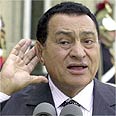
Cracks in the Egyptian dam
Egypt has a long way to go before it can be called a full democracy, but an unstoppable process has been set in motion
For the first time since the Free Officer’s revolution in 1952 (and, from a certain perspective, for 5,000 years), Egypt will hold its first contested election. According to forecasts, Hosni Mubarak will take between 65 and 85 percent of the votes – a result that will satisfy the Egyptian president.
Such a result would mean that he would not need a second round in order to return to office. Mubarak can wave the results to both the Egyptian people and the international community as proof of the success of Egypt’s ‘democratic reform.’
This time, votes are being distributed between 10 candidates – gone are the days where 99 percent of voters cast a ‘yes’ ballot in a national referendum on extending Mubarak’s rule.
However, news agencies reported on a number of irregularities during the election. The protest movement, Kifaya (Arabic for ‘enough’) held an unlawful demonstration on election day, protesting what it said was the use of systematic forgery by the ruling party.
But the most important factor of these elections is that the Egyptian nation voted with its feet. There are reports of an enthusiastic participation of the public, after dozens of years in which the real percentage of ‘voters’ did not rise beyond 30 percent.
If the reports are verified, the large scale participation of the Egyptian people could well be the most significant legacy of the current elections.
The public felt that it could make a difference, and moved quickly to act on its basic interest – if the opportunity for it do so was, finally, made possible.
Until the change of Clause 76 in the Egyptian constitution, the parliament in Cairo would choose one candidate (put forward by the army and the security services), and the public was then asked to approve the candidate through a referendum.
This ceremony was abolished after a Washington sponsored intensive year long campaign of pressure to advance democracy in the Middle East.
New era
A new situation was therefore born in Egypt. The public rose, and a section of it dared to tell Mubarak: ‘Enough, we don’t want you anymore.' Egypt had an absolute taboo on criticizing the president (as it did on negative remarks on the army, and relations between Muslims and the Coptic Christian minority).
Surprisingly, Mubarak found himself in the unexpected position of having to defend himself and his regime, and of preventing a situation of chaos.
The Egyptian president did manage to recover, however, and quickly changed the voting system to ensure a multiplicity of candidates, designing a system that began to resemble a democracy.
The dam has burst, but only to a certain level – a controlled crack of sorts.
The new electoral system only allows party representatives to run for president. Independent candidates face much tougher qualifications, a hurdle placed by Mubarak which allows him to rule out the possibility of well known and respected figures from outside the political system from running and presenting their platforms.
In addition, Mubarak retains control of all the state’s resources, communications, and finances, which should guarantee his reelection.
Despite all this, Mubarak did for one month, descend from his throne, and became one of several candidates. He spent a month campaigning, explaining to the Egyptian people his plans for the future, and asking the nation to vote for him. He was photographed on Wednesday at the polls, dying his finger after voting, like one of the people. Those images will not be forgotten quickly.
But do the Egyptians have a real alternative? Today’s opposition is not ready to take power. The three main opposition parties – the left wing Tagama party and the Nasserist party boycotted the elections, while the third party, the Wafed, has had a limited impact on the electorate, with a limited budget and small resources. The remainder of the parties are small and relatively unimportant.
Religion versus state
The Muslim Brotherhood should not be forgotten, despite being banned since 1954. In free elections, the movement could pick up as much as a third of votes. But the issue of religion was not prominent in the campaigns, despite a process of Islamification of Egyptian society in recent years.
In Egypt, there is legitimacy today to the idea that one can be a good Muslims, without demanding an Islamification of the government – and the Muslim Brotherhood will have to take that onboard.
And what about Egypt’s northern neighbor? Like religion, Egyptian – Israeli relations barely figured in the campaign.
Northern neighbor
Only Ayman Nur, head of the al-Ad (Tomorrow) party, called for the end of normalization with Israel in one of his speeches. But no one spoke against the peace treaty.
This should not however, be confused with the notion that hatred of Israel does not exist. But what is important to the Egyptian people is their income – and nobody plans on returning to the wars of history.
One cannot expect the Egyptian people – 50 percent of which cannot read or write, and who’s societal structure is based on tribalism and clans, to start functioning as a democracy overnight. There are also question marks over the status of the army, which has become accustomed to being the silent partner of the ruling regime.
With that, however, a process has begun, and it is doubtful whether the train can now be stopped. Mubarak will have to keep his promises, of further democratization, and an improved economy.
A powerful hope has been awakened in Egypt, and the first sparkles of democracy can be discerned.
Zvi Mazel was Israel’s former ambassador to Egypt










